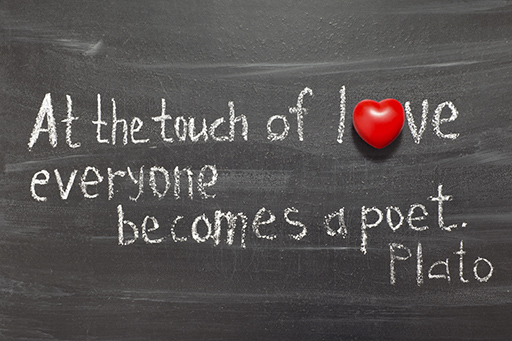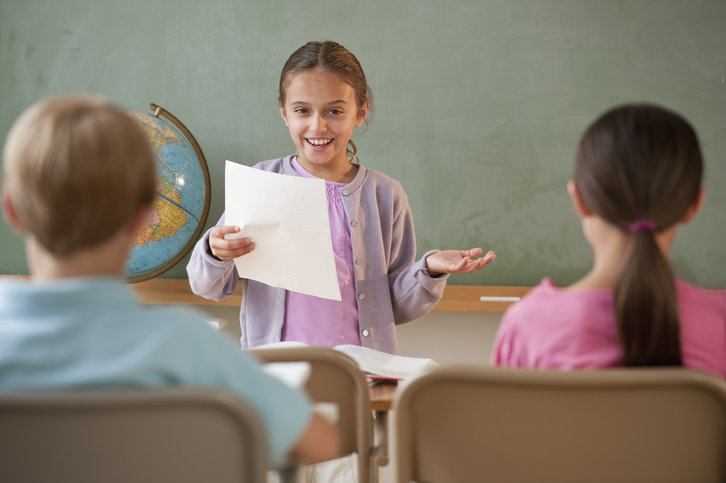Here's why we shouldn't give up on poetry
Here’s why we need daily doses of poetry to nourish our hearts and nurture our souls
‘I'm glad the sky is painted blue,
And the earth is painted green,
With such a lot of nice fresh air
All sandwiched in between.’- Anon.

‘When we bring forth the spirituality of teaching and learning, we help students honor life’s most meaningful questions.’- Parker J. Palmer, founder, the Center for Courage & Renewal
‘Be patient toward all that is unresolved in your heart…Try to love the questions themselves…Do not now seek the answers, which cannot be given because you would not be able to live them—and the point is to live everything. Live the questions now. Perhaps you will then gradually, without noticing it, live along some distant day into the answers.’- R.M. Rilke (1993). Letters to a young poet.
We become teachers for reasons of the heart.
But many of us lose heart as time goes by.
How can we take heart, alone and together,
So we can give heart to our students and our world,
Which is what good teachers do?-THE HEART OF A TEACHER: Identity and Integrity in Teaching
In the beginning were the words...They bacame languages...They became poetry...They became how we express and project love, goodness, commitment and more
Let the words sing to you, dance for you, empower you to become the person you envision yourself to be: This is the mystery of poetry
How Wisdom Grows- Educating Hearts and Minds

Photo: montville.net
'Educating the mind without educating the heart is no education at all.'- Aristotle
‘Teach your children poetry. It opens the mind, lends grace to wisdom and makes the heroic virtues hereditary.’- Sir Walter Scott
This offering today responds to the pertinent and timeless question: how can we, the teachers, educators, parents, policy makers,..., create spaces in schools, homes, universities, communities,..., where children’s, students’ and the youth's whole being, (that is, heart, body and mind), is nourished, nurtured, enabled and empowered?
Lest we forget, this, and other similar questions are increasingly being asked in today's educational practices, now widely acknowledged to be impacted from an imbalance towards the training of the intellect in neglect of the cultivation of the senses, imagination and realms of the heart and mind.
In eloquently expressed words of T.S. Eliot:
"Where is the Life we have lost in living?
Where is the wisdom we have lost in knowledge?
Where is the knowledge we have lost in information?"
In response, to my mind, we need to begin the process of reversing and replacing the neoliberal, values-less education with an education for the "soul," wherein "soul" is to be understood as the mediating perspective which acts as a torch, brightening and illuminating the middle ground between mind and body, worthiness and unworthiness, knowledge and wisdom, ideas, visions and experiences, spirituality and the world, so on and so forth.
An education that nurtures the soul, whilst nourishing the heart, ultimately speaks to the mysterious depth of the being, in this journey we call life, through the language of the heart and imagination. As all sages and philosophers of life and love have reminded us, again and again, it is from literature and poetry that we learn this Language.
Hence an education for the soul and Heart, will infuse the whole curriculum with poetry, thereby stretching the limits of imagination, understanding and scope of perception.(*)
All in all, Poetry offers new lenses, clears our vision and empowers us to focus our minds, through which we can look out at the world and watch all we do and all we are with increasing awareness, attentiveness, care, compassion and commitment. Poetry nourishes in us the possibility for harmonious living, promoting inner-peace and releases voices of joy and happiness, giving us the eyes to really see: this is the effervescence of learning to live and loving to learn. This has been a gift to us all. Long may it be so.
......
But, and very sadly, those with no vision, heart and soul have now decided to sideline
poetry from the school curriculum in England.

Photo: Why children need poetry – and how to inspire them
‘In an age in which we flee from ambiguity and complexity, poetry gives us permission to wonder.’- Kenan Malik, The Observer
'In your light I learn how to love. In your beauty, how to make poems. You dance inside my chest where no-one sees you, but sometimes I do, and that sight becomes this art.'- Rumi
Nota bene
How Persian Mystic Poets Have Changed My Life
'I learnt my love of mysticism and appreciation of mystic poetry from my late father, a businessman by trade and a connoisseur of Sufi poetry by tradition. For my father, nothing was more sacred than poetry — specifically the Persian mystical poetry. To him the Persian poets were the true sages, the gems of humanity, the philosophers of love, beauty and wisdom.
I remember he used to tell me all the time that, Kamran ‘These mystical poets can help you lead a better life, I am sure when you get older you will discover that for yourself.’ Reflecting back now, I can only say how right he was.'...Reflecting on Life: My Childhood in Iran where the love of poetry was instilled in me
And then, decades later, a wise friend, a philosopher of love, a man of many gems, once told me that when the world is in turmoil, when you feel lonely and in despair, the best gift you can give to yourself is to remain hopeful and not lose faith. He told me reading or listening to poetry encourages that quietening. It is a universal soul language that allows us to become quiet enough to hear the music, the beat of our truest longings, the rhythms of our hearts, the sounds of mother nature, and the feelings of love and belonging. He then gave me a copy of one of his many books, ‘Seasonal Poems of England’ to keep me company with true beauty and hope.- That friend was the late Prof. Fr. Peter Milward. See also: Finding sanctuary in poetry during lockdown
…...
It is so heartbreaking to see that the populist, neoliberal politicians, pursuing a values-less education have removed anything and everything linked to creative or critical thinking in education. They have put a full stop on what it means to have an inquisitive mind, what it means to be human. They want everybody to be their bag carriers, their rubbish collectors, not to be clever enough, asking pertinent questions and carry on voting for them, against their own self interest.
All said and done, this is very evident in their recent actions to sideline poetry from the school curriculum, the same way as they did to the study and understanding of nature, arts/humanities or the truthful teaching of history of the ‘Empire’, racism, xenophobia and more.
‘Poetry is powerful, often because it is concise, it can make us feel differently about something in a way in which a government report or even a piece of journalism cannot – which makes it an important topic of study in literature.’- John Butcher, The Open University
Poetry is a very rich and unique intangible heritage, a beautiful legacy that its inhabitants are aware of from childhood. Poetry is a way of existing, a way of relating to and conceiving the world, a political action and an act of power. To omit poetry is to delete humanity, civilisation, history and culture.

Photo:open.edu
Poetry is the key which unlocks the gates of wisdom
In these challenging and troubling times of self-isolation and social distancing, it seems more important than ever to build, maintain, and nurture our collective spirit of humanity, community, and neighbourliness. What better way to do this than through poetry to guide us through our journey of healing.
Determined to find an uplifting moment every day, I have been reciting poetry at Dawn for many years now. But I must admit this long held habit of mine has provided a particularly welcome escape into a sense of calmness in recent weeks.
Reading poetry, solitude, silence and sanctuary: finding ourselves on pilgrimage of self-discovery
Poetry to calm the anxious mind
Beauty in words, others' and mine
A Poetic Pilgrimage to Wisdom
“Now I am made one with You and from that Union my heart is consumed with rapture and my tongue is bewildered. By union, I have been merged in the Unity, I am become altogether apart from all else. I am You and You are I - nay, not I, all is altogether You. I have passed away, ‘I’ and ‘You’ no more exist. We have become one and I have become altogether You”--Farid ud-Din Attar, one of the most ancient poets of Persia
Poetry is the key which unlocks the gates of wisdom
Lockdown lawyers finding solace in poetry to deliver justice in times of COVID-19

Photo: British Council
‘Finding meaning in verse can be a challenge for teenagers. But it is also a joy, and letting them drop it is the wrong move.’
‘The particular joy of reading it in groups is learning to enjoy the thrill of the chase after meaning, and to recognise that different interpretations are valid.’
“Had we but world enough, and time…” The opening line of Andrew Marvell’s To His Coy Mistress sums up the dilemma of the English exam regulator Ofqual, which this week decided the Covid-19 crisis means that next year GCSE English literature students will, if they wish, be able to drop poetry completely. Ofqual feels that, with no certainty of a full return to school in the autumn, it will be “extremely challenging” to teach a full syllabus. It worries that students would struggle “to get to grips with complex literary texts remotely”.
This is no doubt true, but Ofqual’s solution is perverse. Study of a Shakespeare play has been deemed sacrosanct – no doubt making Shakespeare optional would have caused a tempest. The other three time-honoured components – the 19th-century novel, post-1914 British fiction and drama, and poor old poetry – will be optional, with students having to pick two from three. Modern fiction and drama is likely to be a default choice for many, leaving a straight fight between Donne and Dickens.
Poet and teacher Kate Clanchy, recent winner of the Orwell prize for political writing for her memoir Some Kids I Taught and What They Taught Me, explained earlier this week why this decision risks damaging the wider cause of the humanities, because of the signal it sends about them being disposable extras. She also pointed out that Ofqual is out of step, since poetry is riding a wave of popularity among teenagers. Judith Palmer, director of the Poetry Society, highlighted the diversity of contemporary poets as another factor in the subject’s favour. And she is right that it would be a step backwards to cut it just as an increasing number of writers of colour are making it on to syllabuses – and poetry is, in defiance of some people’s expectations, holding its own against other cultural forms amid ferocious online competition.
The unresolved, open-ended nature of so much poetry, where meaning has to be extracted from intense engagement with language, is all too appropriate for our present age of uncertainty. The particular joy of reading it in groups is learning to enjoy the thrill of the chase after meaning, and to recognise that different interpretations are valid. Children’s author Michael Rosen summed it up: “Poetry offers a view on humanity, society and the world that is playful, contemplative, mysterious, questioning, and one that is often interested in giving readers the chance to hold several different ideas in our heads at the same time.”
Rather than streamlining reading lists, it might instead be time to change the way students are examined. Read Marvell because he is marvellous, not as a means to passing an exam. If the pandemic is making the current exam system unworkable, find another way of encouraging young people to study – and, better still, to love – literature. Poetry is about response, not regurgitation; the joy of intellectual inquiry; the free play of the spirit. That is what Ofqual should be protecting.’- Editorial-The Guardian view on poetry in schools: don't let it go
Poet laureate Simon Armitage and former children’s laureate Michael Rosen are among the top UK poets decrying the government’s decision to make poetry optional for GCSE students next year, describing it as “a dangerous first step”.
Armitage, whose work has been part of the GCSE syllabus for the last two decades, said the decision was sad.
“This is a time when poetry seems to be really having its moment, because of the comfort, consolation and form of expression that people have found in poetry over these months. Among younger people, it seems a very vibrant, popular art form,” said Armitage. “It’s a worry that making it optional might have a knock-on effect and just make it one of those add-ons that it’s been at times in the past.”
“Poetry is language at play, and a lot of the time in a school or classroom environment, students are expected to use language in a very rational, logical and informational way. To be denied the opportunity to think of language as nuanced and playful is a pity,” he added.
Rosen called the decision wrong.
“By making it voluntary they are in effect ensuring that a percentage of students at English schools will not do any poetry in years 10 and 11,” Rosen wrote on Facebook. He recently returned home after being treated in intensive care for Covid-19. “Poetry offers a view on humanity, society and the world that is playful, contemplative, mysterious, questioning, and one that is often interested in giving readers the chance to hold several different ideas in our heads at the same time.”
Poet Imtiaz Dharker agreed. “People have reached for poetry like a lifeline in this pandemic. That’s why it is a pity to treat it as expendable, even for a year. Especially this year,” she said…- Continue to read
‘Poetry saved me. Don’t deny it to next generation, pleads award-winner’
‘Rhythm, humour and politics of verse give young people a voice. Making it optional at GCSE is a mistake.’-Kadish Morris
…’Although I was in the top set for many subjects, there were only a few classes that I felt genuine curiosity for, one of them being English literature. There were fewer absolutes. It felt like one of the only spaces in education where what I thought seemed to matter.
Yet in recent years, it has felt as though anything linked to creative or critical thinking has been stripped to the bare minimum. Last year art was excluded from the new English baccalaureate; this year poetry has been dropped – English-exam regulator Ofqual announced last week that 2021’s GCSE English literature students will be given the option to drop poetry completely due to “difficulties for students in trying to get to grips with complex literary texts remotely”. Many see the move as damaging to young people who, should they choose to opt out, may never get the opportunity to fall in love with verse.
Not every student will like poetry, but those who do are enchanted by its rhythm, humour and the politics held within. It examines experiences that are otherwise left unexplored by the rest of the curriculum, namely identity. Reading Half Caste by Afro-Guyanese poet John Agard was one of the first times I remember encountering Caribbean patois in a classroom. The poem sounded like a conversation I might overhear on the streets of my neighbourhood. While I enjoyed reading Macbeth, Of Mice and Men and other classic texts, poetry was the part of English literature that spoke directly to me and made me want to write…’- Continue to read
......
Similar and related topics:
Britain today and the Bankruptcy of Ideas, Vision and Values-less Education
Brexit, Trump and the failure of our universities to pursue wisdom
Neoliberalism destroys human potential and devastates values-led education
Students as Customers? What utter nonsense!
The rise in global fascism: A failure of education?
A timeless reflection on two types of teaching and learning
The Journey to Sophia: Education for Wisdom
What if Universities Taught KINDNESS?
(*) For an excellent perspective on some of the issues raised in this posting from a teacher See HERE
